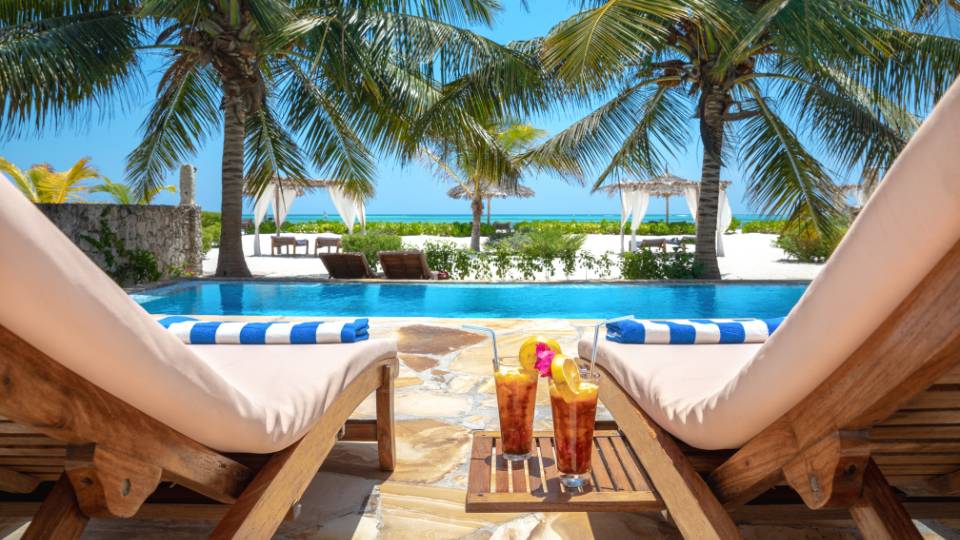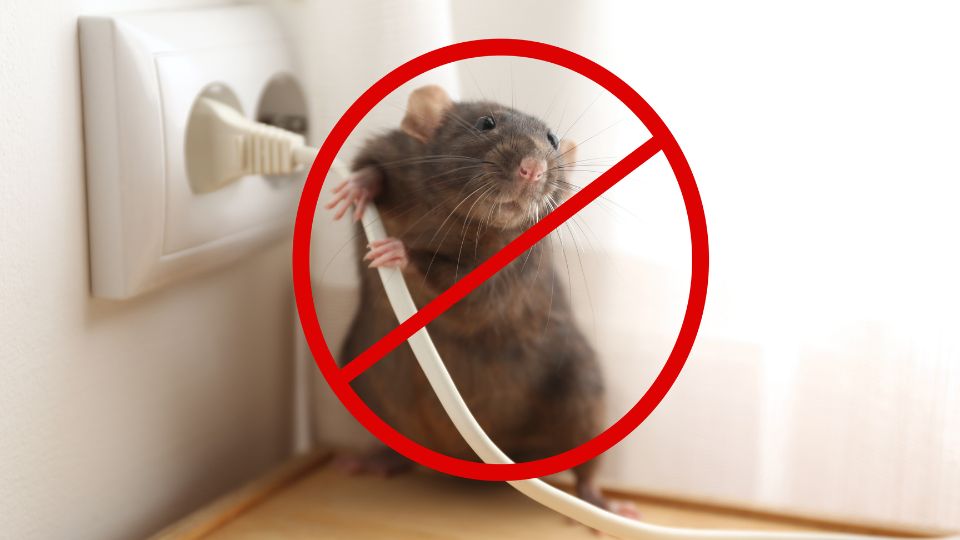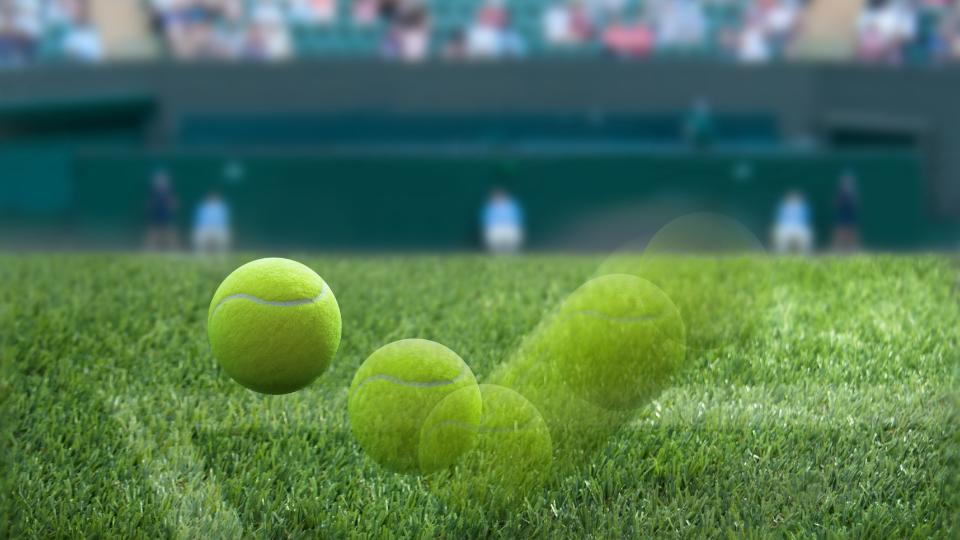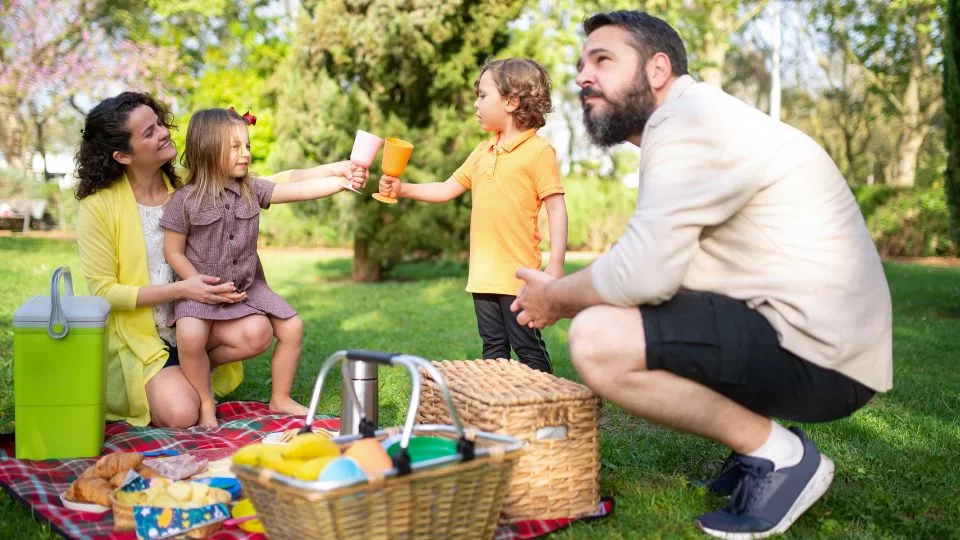
Picnics are a quintessential summer activity, offering the perfect opportunity to enjoy the great outdoors with family and friends.
However, the aftermath of a picnic can often result in unsightly litter that harms the environment and we’re sure you’ll agree – an eye sore.
In this blog post, we’ll explore the importance of maintaining a litter-free picnic experience during the summer of 2024.
By following these tips, you can minimise waste, protect nature, and enjoy your picnics guilt-free.
Picnic Litter Statistics 2024
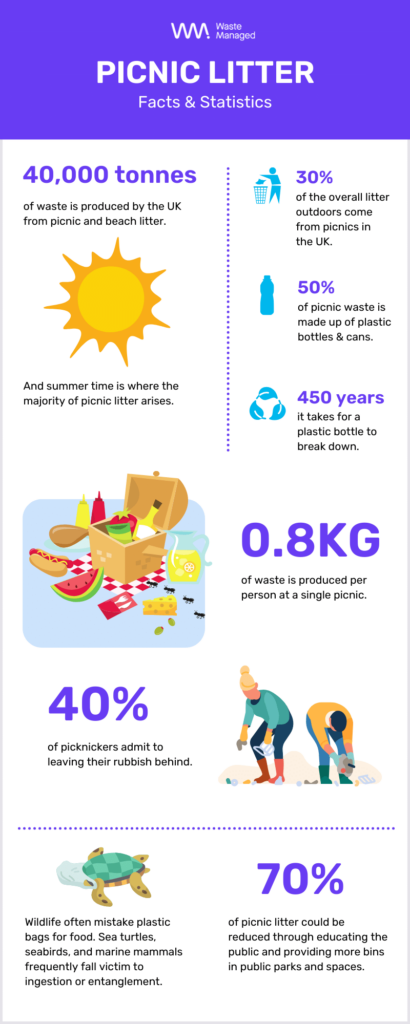
- The UK produces around 40,000 tonnes of waste from discarded beach and picnic litter each year.
- Picnickers contribute to approximately 30% of the overall litter in outdoor recreational spaces.
- On average, a single picnic generates around 0.8 kilograms of waste per person.
- Over 80% of marine litter is derived from land-based sources, including picnics.
- Plastic bottles and aluminium cans account for approximately 50% of picnic litter.
- It takes an estimated 450 years for a plastic water bottle to break down in the environment.
- Every year, picnickers discard billions of single-use utensils, contributing to the global plastic waste crisis.
- Beach cleanups frequently identify food wrappers and beverage containers as the most common types of picnic-related litter.
- More than 40% of picnickers admit to leaving their rubbish behind, unaware of the long-term consequences.
- Wildlife often mistake plastic bags for food, with reports indicating that sea turtles, seabirds, and marine mammals frequently fall victim to ingestion or entanglement.
- In urban areas, improper disposal of picnic litter can clog storm drains and contribute to flooding during heavy rain events.
- Research conducted by WasteManaged suggests that implementing effective waste management systems and educating the public can reduce picnic-related litter by up to 70%.

The Impact of Picnic Litter
Picnic litter may seem insignificant to individuals, but its consequences when all added up are far-reaching.
Plastic bags, disposable cutlery, and food wrappers contribute to pollution, endanger wildlife, and disrupt ecosystems.
A significant portion of the litter found in parks and natural areas comes from picnics.
By understanding the impact of picnic litter, we can take action to reduce our ecological footprint and protect our natural beauty spots.
Have you read our latest update on the impact of littering in the beautiful Lake District?
Planning Ahead for a Litter-Free Picnic
A little preparation goes a long way in preventing picnic litter.
Try to choose a picnic location that provides waste management facilities like dedicated bins or recycling areas.
Take a little bit of time to research parks or outdoor areas that promote sustainable practices.
Before heading out, pack a separate bag for rubbish and recyclables, making it easier to collect and dispose of waste responsibly.
Eco-Friendly Picnic Essentials
Investing in eco-friendly picnic essentials is a crucial step towards a litter-free experience.
Opt for reusable cutlery, plates, and cups made from sustainable materials like bamboo or stainless steel.
These options not only reduce waste but also add a touch of elegance to your picnic spread.
If disposable items are necessary, choose biodegradable or compostable alternatives that break down naturally over time.

Mindful Food and Beverage Choices
The food and beverages we bring on our picnics can also contribute to litter.
To minimise waste, consider opting for locally sourced and organic picnic food.
Visit farmers’ markets or local suppliers to find fresh, seasonal produce and support sustainable agriculture.
Instead of single-use plastic bottles, bring reusable water bottles and refill them at water stations or use portable water filters.
If you prefer other beverages, choose options packaged in recyclable materials or bring your own homemade drinks in reusable containers.
Leave No Trace: Cleaning Up After the Picnic
Leaving the picnic area clean and tidy is a fundamental principle of responsible picnicking.
After enjoying your meal, gather all rubbish and dispose of it properly in designated bins.
Make sure to separate recyclables like plastic bottles, aluminium cans, and glass containers from general waste.
If you notice additional litter left behind by others, make an extra effort to pick it up.
By leaving no trace, you leave a positive impact on the environment for others to enjoy.
Have you read our recent update on River Litter in the UK?
Spreading the Litter-Free Message
Promoting a litter-free culture extends beyond individual efforts.
Share your commitment to litter-free picnics with friends, family, and social media followers.
Use platforms like Facebook, Instagram, Twitter, or TikTok to spread awareness, share your experiences, and encourage others to adopt eco-friendly picnic practices.
Explore local cleanup events or organisations that support litter prevention and consider participating in their initiatives.
Together, we can make a significant difference in preserving our natural spaces.

Let’s End Picnic Litter Together!
This summer, let’s make a collective effort to enjoy picnics while protecting the environment.
By planning ahead, choosing eco-friendly essentials, making mindful food choices, cleaning up after ourselves, and spreading the litter-free message, we can create a positive impact.
Let’s embrace the beauty of nature and leave our picnic spots cleaner than we found them.
Together, we can make Summer 2024 a season of litter-free picnics and sustainable enjoyment of the great outdoors.

